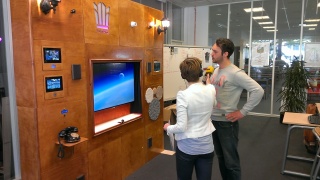
In the NWO programme Data-driven research on Sports & Healthy Living three proposals have been granted. Consortia from Dutch and Brazilian researchers will collaborate in the field of sports and healthy living.
One of the subsidized projects is ‘Playful Data-driven Active Urban Living’ (PAUL). In this project the Digital Life Centre collaborates with University of Amsterdam, University of Utrecht and Federal University of São Paulo (UNIFESP).
In this proposal the applicants want to understand in more detail how physical activity of city dwellers can be increased by using personalized app technology. What type of app works, is highly individual and this means that the right type of app may depend on the person’s current physical activity level, health, personality and residential context. How to make the optimal match between app and user is unclear.
The applicants aim to gain insight into the effectiveness of elements within an exercise app (motivational feedback, goal setting, individualized messages, gaming elements) for making people more physically active, and how the effectiveness depends on characteristics of the individual and the urban setting. The sensors on the mobile phone, together with sensors (beacons) in public spaces, combined with sociodemographic and land use information will generate a massive amount of data.
The implementation of the app in São Paulo and Amsterdam will provide the applicants with (big) data on use of functionalities, physical activity, motivation etc. allowing them to investigate in detail the effects of personalized technology on lifestyle in different geographical and cultural contexts.








